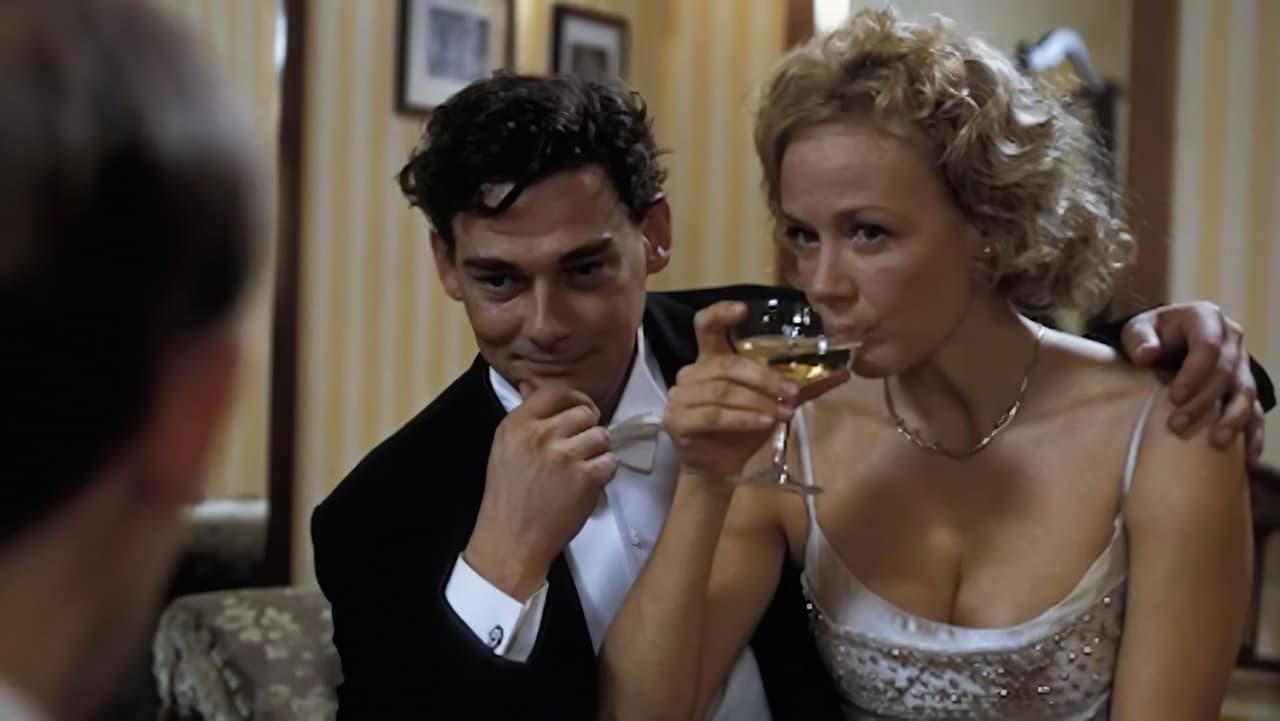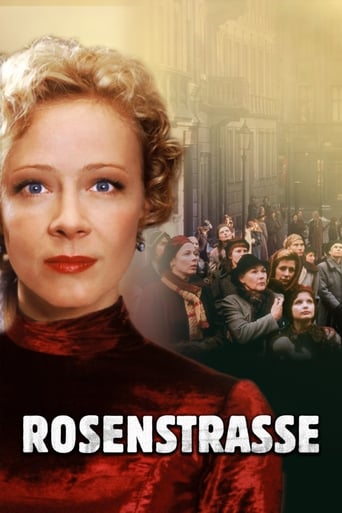

Very well executed
... View MoreExcellent, smart action film.
... View MoreAwesome Movie
... View MoreExcellent characters with emotional depth. My wife, daughter and granddaughter all enjoyed it...and me, too! Very good movie! You won't be disappointed.
... View MoreI'm always surprised about how many times you'll see something about World War 2 on the German national television. You would think they don't like to open old wounds, but there isn't a week that goes by without a documentary or a movie about the horror and atrocities of this war. Perhaps it's a way of dealing with their past, I don't know, but you sure can't blame them of ignoring what happened. And it has to be said: most of those documentaries are really worth a watch because they never try to gloss over the truth and the same can be said about their movies (think for instance about "Der Untergang" or "The Downfall" as you might now it) which are also very realistic.One of those movies is "Rosenstrasse". It tells a true story and deals with the subject of the mixed marriages during the war, even though the movie starts with a family in the USA, at the present day. After Hannah's father died, her mother all a sudden turned into an orthodox Jew even though she hasn't been very religious before. She doesn't know where the strange behavior of her mother comes from, but as she starts digging in her mother's troubled childhood, Hannah understands how little she has ever known about her mother's past.The fact that this movie deals with the subject of the mixed marriages during the Nazi regime is already quite surprising. For as far as I know, there hasn't been another movie that deals with this subject. (For those who didn't know this yet: Being married to a so-called pure Aryian man or woman meant for many Jews that they weren't immediately sent to one of the concentration camps, but that they had to work in a factory). But it does not only tell something about the problems of the mixed marriages, it also gives a good idea of how these people were often seen by their own parents and relatives. How difficult it sometimes was for them during the Nazi regime and how these people, most of the time women, did everything within their power to free their men, once they were captured and locked away in for instance the Rosenstrasse...The acting is really good and the story is very well written, although the way it was presented in the beginning didn't really do it for me (and that's exactly the only part that you'll get to see in the trailer). Perhaps it's just me, but I would have left out a big part of what happens in the present day. At least of the part that is situated in the USA, because the part where Hannah goes to Berlin and talks to someone who knows more about her mother's past, definitely works.If you are interested in everything that has something to do with the Second World War, and if you aren't necessarily looking for a lot of action shots, than this is definitely a movie you should see. This isn't a movie in which you'll see any battles or gunfights, but it certainly is an interesting movie, because it gives you an idea about an aspect of the war only little is known of. I give it an 8/10.
... View MoreHere is the explanation screenwriter Pamela Katz gave me for why MvT introduced JG as a specific character in the film:"...the historical record is very clear: Joseph Goebbels was directly responsible for the release of the Rosenstrasse prisoners, so we needed a way to get Goebbels himself into our film... For a woman like Lena, a woman from an aristocratic family with connections, it wasn't unthinkable that she would make an attempt to go to the top. The idea of getting to Goebbels wasn't impossible for her, so that became our hook."Those of you who insist on seeing an actual sex act here can read my new thread below & then fire away.Jan Lisa Huttner FILMS FOR TWO
... View MoreMost of the critics raved about this film from a cinematographic point of view, but missed its major message.The viewing public thought the story line thin and contrived, the characters shallow and undeveloped, but they also missed the major message. The film is a first time public presentation of how a handful of unorganised Aryan women in 1943 held a spontaneous week long vigil outside the Jewish Community Center in Rosenstrasse, in the heart of Berlin, where their Jewish husbands were detained by the Nazis pending transportation to the extermination camps. Their demonstration eventually forced the Nazis to release the men.The film's major message was that the Nazi regime was conscious of public opinion and backed down when resisted on the extermination issue. Whilst the women of Rosenstrasse were the only public demonstration of such resistance inside Nazi Germany, there were 2 notable acts of resistance to the Nazi's "final solution". One was the refusal of Boris, King of Nazi occupied Bulgaria to hand over Bulgaria's 50,000 Jews to the Nazi Murder Machine, claiming that they were too important to the wellbeing of the country, and the other was by King Mohamed V of Morocco who answered the Vichy French demand to deport the 265,000 strong ancient Jewish community by saying "There are no Jews in my country, only Moroccans!"The ladies of Rosenstrasse also showed that the Nazis when challenged backed off - it is said that Goebbels himself ordered the rapid release because he feared that if the story be publicised it would encourage further demonstrations against the extermination program.The film left me with the feeling that if the German people and the leaders of the states of occupied Europe had also protested many of the 6 million Jews and many millions of other minority groups could have been saved from the death camps. It reveals as a lie, the claim that ordinary people could do nothing against the Nazi regime - this for me is the film's most important message.
... View More(SPOILERS IN THIS)"Rosenstraße" is a movie about heroic women in German Nazi time. But it is way too long, it is not touching and sometimes even boring! There are too many clichés and not enough good acting.The storytelling (storyline) is bad. Like in James Cameron´s Titanic an old woman remembers events of her live. Good, now we´ve got a point of view. Than there is another woman introduced who does the same. Confusing is that they both are recalling events of lifes of other people! Come on! This is a lack of knowledge of basic story telling...How can Riemann know about the fate of the little girl´s mother and her interrogation for example?The scenes are shown in the wrong order and you rarely know when it took place. For example the scene when Riemann is proposing to Fabian. When did that happen? The scene looks like it is set in the Twenties...Riemann´s character is of course a talented pianist, well, she is even a Baroness! Wow. Her brother comes back from the Eastern Front, he has received a "Ritterkreuz" which he is showing in some scenes. So he is a war hero and still a fine man who preserved his conscience. And he gained knowledge of massacres committed by Germans. He even made some photographs! And so it goes, cliché after cliché is piling up and this is why the movie does not work.Basically von Trotta made a chick flick out of something what could have been a decent movie. And in the end it´s all very simple. Riemann finds a way to get Goebbels into bed and - ta da! - everyone is free. Which is not a historical fact but pure imagination despite the "true story" claim at the beginning. Like "Sass" it is vaguely BASED on a true event.It is sad but true, this IS the typical German movie these days. It is bad! Macaulay J. Connor
... View More